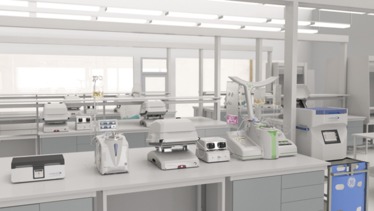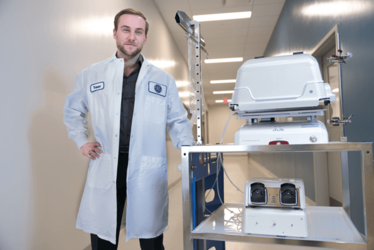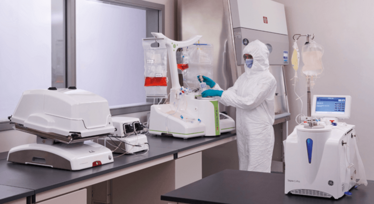Getting on the Fast Track: Manufacturing Training for Cell Therapies
Looking to advance in the exciting area of cell therapy? The new CELLT1 course is here to help bring staff up to scratch.
sponsored by GE Healthcare
Cell therapy is one of the hottest topics right now in the biopharma industry, with ambitious goals for making patients with no other treatment options well again. New developments are reported every day, and more and more companies are looking to expand into this area.
My background lies in microbiology and immunology, so I’m familiar with dendritic cells, T cells and so on. Today, I focus on cell therapy at GE Healthcare – in particular, on the validation of new technologies for producing cell therapies. I also work on developing new intellectual property for future products. Recently, I was asked to help write the course for GE Healthcare’s CELLT1 training course for advanced cell therapy technology, which falls under our Fast Trak training and education services.


Why does the industry need a training course for cell therapies? Similarly to working with other biological drugs, consistency, cleanliness and a suitable background knowledge of the field are critical. Anyone comfortable with traditional cell culture for bioprocessing can learn to work with cell therapies, but there are some specific challenges that require new training – and the equipment is specialized and very much at the cutting edge.
The stakes are also very high, so companies cannot afford errors or time delays. Safety is paramount, so due care and attention must be paid to manufacture and scale up – but, at the same time, there is a push for faster turnaround times and reduced costs. To achieve both, the industry needs innovation around process optimization. GE Healthcare’s Enterprise Solutions, which includes equipment, integrated services and staff training, are designed to help address the challenges associated with scale up and manufacturing site expansion, with a focus on flexibility and efficiency. And one of the latest additions to our offerings is the aforementioned CELLT1 training course. Other training courses tend to be limited to singular components of the process when it comes to cell therapy – yes, there is training for individual pieces of equipment and individual types of operations, but we felt that there was a lack of cohesive, end-to-end manufacturing training courses.
New Ways of Thinking
Changes in the market demand new ways of thinking. How do you scale up to manufacture the new treatments patients need? And how do you satisfy regulators, while minimizing both financial and production risks? GE Healthcare’s Enterprise Solutions bring together a range of services and products, with the aim of supporting companies from process development through to commercialization for biopharmaceuticals and cell therapies. It is based on modular approaches designed to help manufacturers be more flexible and efficient. For example, we offer process development services that can help customers move from open to closed processes that are also scalable. Concurrently, customers can take advantage of our Fast Trak training courses so that staff are trained while process development is being done. GE Healthcare also offers the FlexFactory production platform – a closed, semi-automated solution predominantly using single-use and scalable technology – that can be set up in new or existing manufacturing plants.
There is also KUBio, which is built for the customer with the whole project managed by GE Healthcare. We can help a company break into new markets and take away the stress of figuring out how to get the right permits to break ground – GE Healthcare is a global company so we are accustomed to operating in diverse markets. KUBio is a turnkey solution that can be built out over different phases. It helps minimize business and finance risks by allowing you to adapt more readily to changes in product demand. The KuBio design for cell therapies can produce up to 3,000 doses a year, based on the specific process.
Enterprise Solutions is all about supporting customers from A to Z, from process development, to training staff during the construction of a new facility, to setting up the equipment. The equipment does not necessarily all have to be from GE Healthcare – our goal is to get customers to market faster, and we can work with other suppliers to make that possible. Within 22 months, it’s possible for us to build and qualify a company’s entire manufacturing facility – from closing processes, to training teams, and then handing over the keys to the new facility.

Class is in session
When developing new systems and technologies, you gain a unique insight that can be very valuable. We weren’t satisfied with simply training users on individual pieces of equipment because, ultimately, manufacturers need a variety of different systems and need to be able to coordinate the whole process. In general, the hardware aspect of the cell therapy process is locked down – our Enterprise Solutions can demonstrate the full line of equipment and an optimized floor plan. But instrumentation only gets you so far; companies need reliable, well-trained staff and cross-site alignment to ensure consistency and product safety.
CELLT1 is designed for research and development scientists, process engineers, and manufacturing technicians. It addresses the full cell therapy workflow – from the isolation of target cells, to harvesting, to final formulation for patient administration. It includes training on instruments and standard operating procedures, as well as tips and tricks that we have learnt along the way. Examples of the topics covered are listed in the sidebar, CELLT1 Topics. Obviously, the cell therapy field is still evolving, so the course will evolve over time too. It can also be tailored to individual needs.
One common challenge in the cell therapy manufacturing process is cell expansion – this is one of the longest process steps. Our bioreactor systems are very flexible in terms of programing, which is useful because they can be adapted to any user process, but new users can find new, robust equipment a bit daunting and it is often one of the biggest fear factors during manufacturing. This topic is covered in detail within CELLT1 – and it is also the most customizable aspect of the course; everyone will have different processes and expectations for how cells are to be cultured and expanded.
We also discuss the idea of digitalizing manufacturing processes, which is something we find companies are increasingly interested in. We are working to ensure that our equipment can be integrated into a digital platform that allows users to see the whole scale of the process, such as setting up instruments using the digital cloud and showing potential warning errors as they pop up, which you can access both inside and outside of the laboratory. In doing so, we hope to increase usability and control.
The course will include two different formats. One will be styled like a lecture or presentation, with the aim of teaching the principles behind the technologies. The second format will be “hands on” in the lab, showing students the equipment in action and testing the knowledge they have learned in the lectures.
CELLT1 Topics
- Overview of cell therapy workflows and cell types
- Tube welding and aseptic fluid transfer
- Cell counting
- Isolation technologies
- Transduction and vectors
- Activation process and technologies
- Cell culture media development and design
- Cell expansion and perfusion applications
- Harvesting platforms
- Final formulation and cryopreservation
- Scale-up and scale-out
- Development of standard operating procedures
- Process evaluation and optimization
Graduation day
CELLT1 has been developed to pair with our Enterprise Solutions, so “graduates” should be able to walk out of training and straight into one of their Enterprise suites – and be confident with managing the processes. After the course, students should be able to:
- apply detailed theoretical cell therapy process knowledge to applications across the manufacturing workflow
- identify bottlenecks and troubleshoot specific processes
- perform industry standard techniques related to cell therapy manufacturing
- implement strategies used for process optimization and evaluation.
It may seem easy to overlook the need for a truly skilled workforce, but cell therapy manufacturing requires many people. The flexibility of our Enterprise Solutions is that it allows users to easily scale out into multiple manufacturing suites – companies will need trained staff to work in those suites and standardization to ensure that processes are reproducible anywhere in the world.
Cell therapy is an important component towards a future of personalized medicine; it has long been a goal of the healthcare industry, and to see it unfolding in our lifetime is incredible. Now that the industry has a better grasp of cell therapies and their manufacturing processes, we can really push forward with developing more specific technology platforms. In time, standardization and optimization of the manufacturing process will bolster the field further by reducing costs, accelerating processes, and shortening the turnaround times. At the moment, it is a massive undertaking for companies to develop a cell therapy, but recent speedy FDA approvals have given the industry greater momentum to continue advancing technology to ultimately provide lifesaving therapies to patients who need them.
Seeing our work having a direct impact on patients is really what drives me in all of this. I see products launch – I know they optimize a customer process and this optimization will generate more effective therapies for patients… it’s work we can all feel proud of. I think this is the time for companies to work together and to recognize any success as a success for the field as a whole.
Trevor Smith is an R&D Leader at GE Healthcare Life Sciences, based in Marlborough, MA, USA.
Trevor Smith is an R&D Leader at GE Healthcare Life Sciences, based in Marlborough, MA, USA.



















